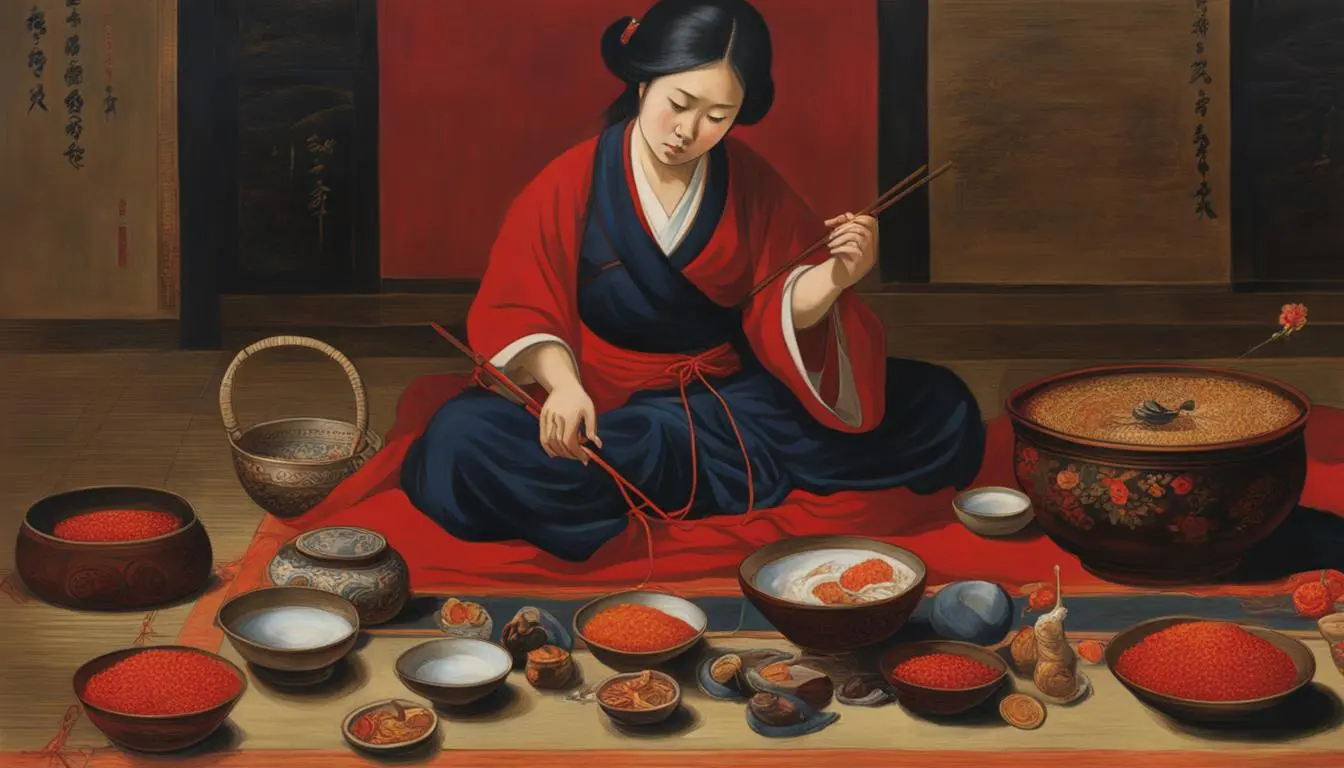
Fertility rituals and beliefs worldwide are deeply rooted in their respective cultures. These practices blend myth, faith, and science to create unique traditions that celebrate and honor fertility. From Asian customs that focus on the state of the mother’s mind and body during pregnancy to African birthing practices that involve traditional midwives, the diversity of fertility rituals is vast and fascinating. The importance of understanding and appreciating these cultural practices cannot be overstated.
Key Takeaways:
- Fertility rituals and beliefs are found in cultures worldwide, reflecting the deep connection between mythology, faith, and science.
- Asian and African customs emphasize the importance of the mother’s well-being during pregnancy.
- Cultural practices such as the Cambodian placenta ritual and Moroccan midwife practices highlight the sacredness of childbirth and the role of support in the birthing process.
- Muslim traditions in Niger and Guatemalan pregnancy seclusion emphasize family involvement and creating a protected environment.
- Mexican bathing beliefs and Greek newborn celebrations showcase the significance of physical well-being and community celebrations.
Related: Which 8 Flowers Symbolize Miscarriage?
The Chinese Pregnancy Traditions
In China, pregnancy traditions are deeply rooted in the belief that the mother’s state of mind and body during pregnancy can have a lasting impact on the temperament and personality of the baby. To ensure a healthy baby, expectant mothers follow a set of customs that involve avoiding evil spirits, refraining from sex, and controlling their thoughts and actions.
- Avoiding Evil Spirits: Pregnant women are advised to stay away from funerals and other events believed to attract negative energies or evil spirits.
- Sexual Abstinence: Couples are encouraged to abstain from sexual activities during pregnancy to focus on the well-being of the developing baby.
- Thought and Behavior Control: Pregnant women are instructed to refrain from gossip, impulsive behavior, and physical labor to create a positive and peaceful environment for the baby’s growth.
These traditions highlight the importance of nurturing a calm and harmonious state for the mother and the baby, emphasizing the belief in the influence of the mother’s mindset during pregnancy.
Chinese pregnancy traditions revolve around the concept of maintaining a positive and peaceful environment for the developing baby.
To further understand the significance of these customs, it is essential to recognize their connection to Chinese cultural beliefs and the desire to ensure the well-being of the next generation. While these traditions may differ from modern scientific practices, they provide insight into the deep-rooted cultural values surrounding pregnancy and childbirth in Chinese society. By honoring and appreciating these customs, we can gain a greater understanding of the diverse range of beliefs and practices related to fertility around the world.
| Chinese Pregnancy Traditions | Beliefs |
|---|---|
| Avoiding Evil Spirits | Protecting the baby from negative energies and influences. |
| Sexual Abstinence | Redirecting focus towards the baby’s well-being and fostering emotional connection. |
| Thought and Behavior Control | Creating a positive and peaceful environment for the baby’s growth and development. |
Through these customs, Chinese culture shines a light on the interconnectedness of mind, body, and spirit during the transformative journey of pregnancy.

The Cambodian Placenta Ritual
In Cambodia, a unique fertility ritual takes place after a woman gives birth. The placenta, considered a sacred and powerful part of the baby’s journey into the world, is wrapped in a banana leaf and placed next to the newborn for three days. After this period, the placenta is buried, symbolizing a connection between the baby, the earth, and the cycle of life. This ritual reflects the belief in the sacredness of childbirth and the significance of honoring the physical and spiritual aspects of fertility.
The Cambodian placenta ritual highlights the deep cultural reverence for the process of bringing life into the world. The wrapping of the placenta in a banana leaf is symbolic of protecting and nurturing the baby, while the act of burying it connects the child to the natural elements of the earth. This ritual serves as a reminder of the cycle of life and the interconnectedness of all living beings.
“The placenta is not merely seen as a byproduct of childbirth, but rather as a sacred and vital part of the baby’s journey.”
By incorporating the placenta into this ritual, Cambodian culture emphasizes the importance of acknowledging and honoring the physical and spiritual aspects of fertility. This tradition not only celebrates the birth of a new life but also recognizes the profound significance of the placenta in nourishing and sustaining the baby during pregnancy. The Cambodian placenta ritual stands as a testament to the rich and diverse fertility rituals found across cultures worldwide.
Sources:
- Sacred Childbirth and Placenta Rituals in Bali: Ancient Ideas for Contemporary Midwifery Practice
- UNICEF – Supporting Cambodian Communities
Moroccan Midwife Practices
Morocco has a rich cultural heritage when it comes to birthing practices, with midwives playing a crucial role during delivery. Midwives, known as “gabla,” employ various techniques to support pregnant women throughout the birthing process. One notable practice is the use of olive oil massage to aid in the baby’s delivery. The gabla gently massages the pregnant woman’s stomach and vulva with olive oil, providing physical comfort and relaxation. This traditional practice not only assists with the physical aspect of childbirth but also offers emotional support to the mother, creating a calm and nurturing environment.
Alongside olive oil massage, Moroccan midwives also utilize herbal infusions to alleviate pain caused by contractions. These infusions, carefully crafted using a combination of herbs, provide natural relief and promote a sense of well-being during labor. The use of herbal remedies reflects the cultural belief in the power of nature and its ability to enhance the birthing experience. By incorporating these herbal infusions into their practices, Moroccan midwives exemplify the holistic approach to childbirth prevalent in their culture.
“In Morocco, midwives play a vital role in ensuring a safe and comfortable birthing experience for mothers. Through the use of olive oil massage and herbal infusions, they provide physical and emotional support, promoting a nurturing environment during labor.”
Overall, Moroccan midwife practices highlight the importance of a supportive and nurturing approach to childbirth. By combining traditional techniques such as olive oil massage and herbal infusions, these practices not only address the physical aspects of labor but also consider the emotional well-being of the mother. The use of natural remedies and the emphasis on creating a calm and nurturing environment reflect the cultural values of holistic care and respect for the birthing process.
Table: Moroccan Midwife Practices
| Practice | Description |
|---|---|
| Olive Oil Massage | Midwives use olive oil to massage the pregnant woman’s stomach and vulva, aiding in the baby’s delivery and providing emotional support. |
| Herbal Infusions | Midwives prepare herbal infusions using a combination of herbs to alleviate pain caused by contractions and promote a sense of well-being during labor. |
Muslim Traditions in Niger
In Niger, Muslim fertility traditions play a significant role in childbirth. According to Islamic customs, only the husband is allowed to touch a woman’s genitals. As a result, during delivery, the husband takes the lead in assisting with the birth, providing physical support to his wife. This involvement not only strengthens the bond between the couple but also emphasizes the importance of family unity and support during the birthing process.
Midwives also play a crucial role in Muslim fertility traditions in Niger. They provide assistance and guidance to the expecting mother, ensuring her well-being throughout the delivery. Additionally, midwives offer herbal drinks to alleviate pain and discomfort during labor. These natural remedies reflect the belief in the power of nature and its ability to aid in the birthing process.
The combination of the husband’s active role and midwives’ assistance creates a supportive and nurturing environment for the expecting mother. It highlights the collaborative efforts of the entire community in ensuring a safe and healthy delivery. By upholding these traditions, Nigerien Muslims honor the sacredness of childbirth and prioritize the well-being of both mother and baby.

| Rituals | Beliefs |
|---|---|
| Husband’s Active Role | Strengthens family bonds through the husband’s leading support during childbirth. |
| Exclusive Husband’s Touch | Symbolizes intimacy and the sacredness of the connection between spouses. |
| Midwives’ Assistance | Reflects belief in the healing power of nature, offering herbal drinks for comfort. |
| Community Collaboration | Highlights unity and support within the community for a safe and healthy delivery. |
| Symbolic Mosque Gathering | Signifies hope, renewal, and unity, creating a peaceful atmosphere for childbirth. |
Guatemalan Pregnancy Seclusion
In Guatemala, many women choose to stay inside their homes for the entire duration of their pregnancies. This seclusion is driven by a fear of being exposed to illness, evil spirits, and the ill will of others, which could potentially harm the pregnant woman and her baby. By remaining in seclusion, Guatemalan women aim to create a protected and peaceful environment for a healthy pregnancy. Additionally, this practice reflects the importance of well-wishing and positive energy during this critical period of life.
Guatemalan pregnancy traditions are deeply rooted in the belief that the physical and spiritual well-being of both the mother and the unborn child must be safeguarded. Staying in seclusion is seen as a way to avoid negative energies and potential harm. This practice is traditionally supported by family members, who take on additional responsibilities to ensure the pregnant woman’s needs are met. By providing emotional support, fulfilling household tasks, and creating a nurturing environment, loved ones contribute to a stress-free pregnancy experience.
“By isolating themselves during pregnancy, Guatemalan women prioritize their health and protect themselves from potential harm, both physical and spiritual.”
Furthermore, seclusion during pregnancy allows expectant mothers to focus on their own well-being and that of their unborn child. It provides an opportunity for introspection, self-care, and bonding with the baby. This period of seclusion is also seen as a time of preparation, allowing women to mentally and emotionally transition into motherhood. In this way, Guatemalan pregnancy seclusion not only emphasizes the importance of physical health but also recognizes the significance of spiritual and emotional well-being.

Table: Rituals and Beliefs
| Rituals | Beliefs |
|---|---|
| Staying in seclusion | Protection from illness, evil spirits, and negative energies |
| Support from family members | Ensuring a stress-free pregnancy experience |
| Focus on self-care | Bonding with the baby and preparing for motherhood |
Mexican Bathing Beliefs
In Mexico, there are specific bathing rituals that pregnant women follow due to cultural beliefs surrounding pregnancy and childbirth. These traditions revolve around the use of warm water and the belief that maintaining a balance in temperature is essential for the well-being of both the mother and the baby.
According to Mexican pregnancy beliefs, it is believed that if the water used for bathing is too hot, it can lead to circulatory problems for the mother and the baby. On the other hand, if the water is too cold, it may result in a rigid pelvis and potentially lead to a difficult delivery. Therefore, pregnant women are advised to use warm water for bathing, ensuring that it is not too hot or too cold, to promote a healthy pregnancy and safe delivery.
This cultural belief highlights the importance of maintaining a harmonious and balanced environment within the mother’s body during pregnancy. It reflects the emphasis on the physical well-being of both the mother and the baby, showcasing the care and attention given to ensuring a positive pregnancy experience in Mexican culture.
Understanding and respecting these Mexican bathing beliefs is crucial for appreciating the cultural diversity surrounding pregnancy and childbirth. By acknowledging these traditions, we can foster a greater sense of inclusivity and cultural appreciation.

Table: Mexican Bathing Beliefs
| Bathing Rituals | Beliefs |
|---|---|
| Use of warm water | Believed to promote a balanced environment in the mother’s body during pregnancy |
| Avoidance of hot water | Prevents potential circulatory problems for the mother and the baby |
| Avoidance of cold water | Prevents a rigid pelvis and potential difficulties during delivery |
Greek Newborn Celebrations
In Greece, the birth of a new baby is a time of great joy and celebration for the entire community. Family and friends come together to honor the arrival of the newborn with special rituals and traditions. The Greek culture places significant importance on showering the baby with gifts and well wishes to ensure a prosperous and protected life.
One of the key elements of Greek newborn celebrations is the act of showering the baby with gifts. These gifts range from traditional layette items such as clothes, blankets, and toys to more significant gifts like silver and gold coins. The purpose of these gifts is not only to provide practical support for the new parents but also to symbolize the community’s blessings and wishes for the baby’s future.
“The Greek culture places significant importance on showering the baby with gifts and well wishes to ensure a prosperous and protected life.”
In addition to gift-giving, Greek newborn celebrations also involve rituals that aim to ward off evil spirits. It is believed that evil spirits may be attracted to newborns, so various protective measures are taken to safeguard the baby. One common tradition is to hang blue or pink ribbons near the baby’s crib, as these colors are believed to repel negative energies. Additionally, Greek families often burn incense or use certain herbs known for their purifying properties to create a safe and positive environment for the newborn.
The Greek culture’s emphasis on newborn celebrations reflects the value placed on community support and protection. By showering the baby with gifts and performing rituals to ward off evil spirits, Greek families demonstrate their commitment to ensuring the well-being and happiness of the newest member of their community.
Table: Greek Newborn Celebrations
| Traditions | Description |
|---|---|
| Gift-giving | Family and friends shower the newborn with practical and symbolic gifts, including clothes, toys, and coins. |
| Warding off evil spirits | Rituals are performed to protect the baby from negative energies, such as hanging colored ribbons and burning incense or herbs. |
| Community support | Greek newborn celebrations emphasize the importance of community involvement and the collective responsibility to ensure the baby’s well-being. |
Swiss Baby Name Secrecy
In Switzerland, expecting parents have a fascinating cultural practice of keeping their baby’s name a secret until the birth. This tradition is deeply rooted in cultural superstitions and beliefs that revealing the baby’s name before birth can bring bad luck. By keeping the name hidden, Swiss parents believe they are protecting their child and ensuring a safe and healthy delivery.
This cultural practice reflects the Swiss emphasis on cautiousness and the desire to safeguard the well-being of the unborn baby. It is a way for parents to create a sense of mystery and anticipation surrounding their child’s arrival. The secrecy surrounding the baby’s name adds an element of surprise and excitement for family and friends when the baby is born.
This tradition is not only unique but also provides insight into the rich cultural heritage of Switzerland. It represents the importance of traditions and superstitions in Swiss society and the deep-rooted belief in protecting and cherishing new life. By honoring and respecting these customs, Swiss parents celebrate their cultural identity while embracing the joy and wonder of bringing a new life into the world.
Table: Cultural Practices Surrounding Baby Names in Different Cultures
| Culture | Baby Name Practices |
|---|---|
| Chinese | Choosing names based on auspicious meanings and avoiding names that are associated with negative connotations |
| Indian | Baby’s name based on astrology, zodiac signs, and religious beliefs |
| Japanese | Choosing names based on the kanji characters‘ meanings and sound symbolism |
| African | Names reflecting cultural heritage, ancestors, and significant events |
“By keeping the name hidden, Swiss parents believe they are protecting their child and ensuring a safe and healthy delivery.”
- The tradition of baby name secrecy in Switzerland reflects the Swiss emphasis on cautiousness and the desire to safeguard the well-being of the unborn baby.
- Keeping the baby’s name a secret adds an element of surprise and excitement for family and friends when the baby is born.
- This cultural practice represents the importance of traditions and superstitions in Swiss society and the deep-rooted belief in protecting and cherishing new life.
Conclusion
Fertility rituals and beliefs are deeply ingrained in cultures around the world, showcasing the rich tapestry of human traditions and values. These rituals blend mythology, faith, and science to create unique practices that celebrate and honor fertility. From Chinese customs emphasizing the mother’s well-being during pregnancy to Greek newborn celebrations, each culture has its own way of embracing the journey of life.
Exploring and understanding these fertility rituals is crucial for appreciating the global diversity of cultural beliefs. It allows us to recognize the importance of these traditions in shaping societies and promoting a sense of identity and belonging. By acknowledging and respecting these practices, we foster a greater sense of cultural appreciation, inclusivity, and unity.
Furthermore, studying fertility rituals provides insights into the human condition and the universal desire for fertility and growth. It reveals the complex interplay between cultural beliefs, individual experiences, and societal structures. By delving into these practices, we gain a deeper understanding of the profound ways in which fertility is woven into the fabric of human existence.
In conclusion, fertility rituals and cultural beliefs offer a window into the diverse expressions of fertility worldwide. These practices demonstrate the interconnectedness of humanity and the power of cultural traditions. By embracing this global diversity, we can build bridges of understanding and celebrate the beauty of fertility in all its forms.
Frequently asked Questions (FAQs)
What are fertility rituals and beliefs?
Fertility rituals and beliefs are cultural practices that blend myth, faith, and science to honor and celebrate fertility.
How do Chinese pregnancy traditions differ from other cultures?
Chinese pregnancy traditions focus on the mother’s mental and physical well-being, emphasizing the avoidance of evil spirits, funerals, and sex, as well as controlling thoughts and actions.
What is the Cambodian placenta ritual?
In Cambodia, the placenta is wrapped in a banana leaf and placed next to the newborn for three days before being buried, symbolizing a connection between the baby, the earth, and the cycle of life.
What are Moroccan midwife practices?
In Morocco, midwives play an essential role in childbirth, using olive oil to massage the pregnant woman’s stomach and vulva, providing emotional support, and creating herbal infusions to alleviate pain during contractions.
How do Muslim traditions in Niger involve family support?
According to Muslim tradition in Niger, the husband takes the lead in assisting with the birth, while midwives provide herbal drinks to ease the mother’s pain, emphasizing family involvement and natural remedies.
Why do Guatemalan women choose to stay in seclusion during pregnancy?
Guatemalan women stay in seclusion during pregnancy to protect themselves and their babies from illness, evil spirits, and negative influences, creating a peaceful and protected environment for a healthy pregnancy.
What are Mexican bathing beliefs during pregnancy?
In Mexico, pregnant women adhere to bathing rituals using warm water, believing that water that is too hot or too cold can cause circulatory problems or a difficult delivery, highlighting the importance of maintaining balance and harmony in the mother’s body.
How do Greeks celebrate the birth of a new baby?
In Greece, the birth of a new baby is celebrated joyously by the entire community, with family and friends gathering to shower the newborn with gifts, including layette items, silver and gold coins, and stones believed to ward off evil spirits.
Why do Swiss parents keep their baby’s name a secret?
Swiss parents keep their baby’s name a secret until birth due to cultural superstitions that revealing the name can bring bad luck, reflecting the desire to protect the child and ensure a safe and healthy delivery.
What can we learn from exploring fertility rituals and beliefs?
Exploring fertility rituals and beliefs allows us to appreciate the global diversity of cultural practices surrounding fertility, fostering a greater sense of cultural appreciation and inclusivity.
Source Links
- https://www.ncbi.nlm.nih.gov/pmc/articles/PMC4769851/
- https://contraceptionmedicine.biomedcentral.com/articles/10.1186/s40834-023-00225-z
- https://fertilitycenterlv.com/blog/pregnancy/fertility-customs-around-the-world/








